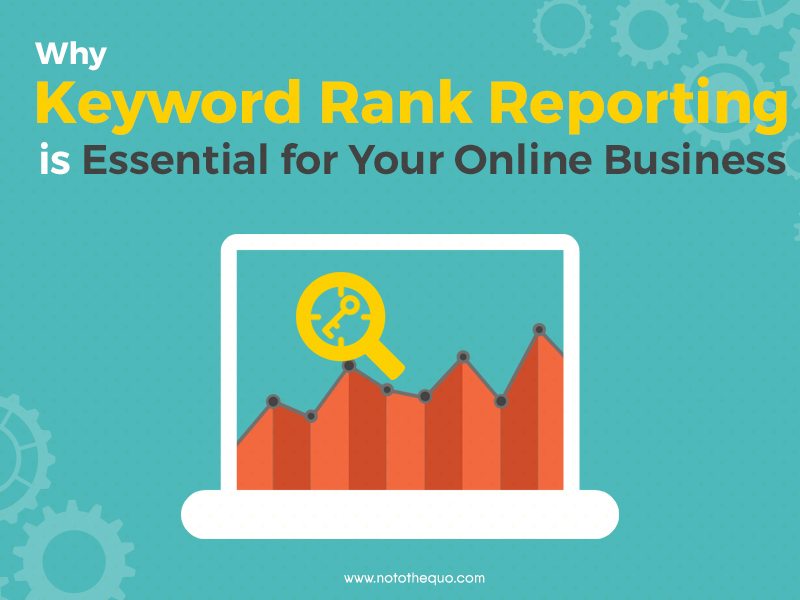Why Keyword Rank Reporting Is Essential For Your Online Business
What if I told you that if you raced from New York to Los Angeles and made it first out of the tens of thousands of opponents, you could be a wealthy person? Sounds amazing, right? But it’s also a slim chance. Now, what if I told you everyone can use a map for navigation but yours is the only one with the roads printed on it? This is essentially what keyword research and rank reporting is. It’s a roadmap that indirectly lays out the ideal paths for your company to get to the prize in the quickest amount of time.
And what is this prize? It’s the #1 spot in search engines for that keyword; which once you’re the victor, it’s easier to hold the spot and soak in all the potential customers, month after month. Now, I’m not going to tell you to drive from coast to coast without giving you the most detailed map possible. So let’s get down to it!

Find Your Ideal Keywords
If your online business already has content and the basics setup of an online business, then you should be ranking for some keywords on your webmaster tools/search console or you can go check your rankings at places like SEMRush. This will give your business a vague outline of what keywords you are ranking for and the types of searches. If your business is more localized, then finding your keywords is a bit more problematic due to being put in a localized search results. These would be keywords like “pizza near me”, “carpet cleaner in Seattle”, etc. as the user intent is looking in an local. But I’ll talk more about this down in the localized searches.
Know Your Competitors
In the online market, your business cannot be that ostrich with its head in the sand. Competition is everywhere! Succeeding and failing around you while you try to figure out what is working for your own business. Watching your business competitors and their keywords can give you insight you may have never known about and growth opportunities they aren’t highly ranking on.
With any keyword ranking report, you should always have a dynamic list of competitors. This will accomplish these three things:
- A snapshot of your rank on a certain keyword in a search engine
- Indicator of what keywords are potential for future campaigns and more growth
- A snapshot of your competitors and where they fall in the same snapshot results
Once you start finding competitors that closely relate to you on your keyword ranking report, you can start looking into their backlink strategies and finding how link-building opportunities.
Visibility in Your Targeted Areas
Let’s talk about localized search. Most businesses are not national. You are probably a brick and mortar store and have a radius of where you might service or people might come to you. Having said that, no two searches are the same anymore. A user that searches “pizza near me” in Bellevue is going to get a completely different search page; versus a user that searches “pizza in Seattle”. What does this mean? It means it’s time to start segmenting even deeper into target locations. This is to find how much visibility your business is capturing in the local area.
Most rank reports won’t show you localized visibility. This would take an extra step to see where you rank for a certain keyword in a specific location. You can manually do this by setting up an Adwords account and going to the Ad Preview and Diagnosis page to test a localized search and see where your website ranks for that keyword. Of course, with building reports like we do for hundreds to thousands keywords per client, we’re able to streamline this process with some powerful SEO tools to create rank reports for clients.
Know Your Past for the Future
How do you know if your business is excelling without looking into the past? This holds true to knowing your online presence and how well you are doing in your local market.
Relevance + Distance + Prominence = Local Ranking
When you’re a physical location, like Seattle, ranking for keywords in the local three pack or web SERPs deal with local ranking. These three things are what makes them shows on the local ranking results.
Relevance
When a user has an intent, they will want relevance to their search query. If I’m looking to order some pizza to be delivered, I’m hoping Google or Bing is going to show me pizza shops in my area that deliver. Relevance to a user is a BIG factor. And just because a keyword might somewhat correlate to your business, if you don’t offer that service, product, or intent then your irrelevant to that user and can be dropped off from that local keyword ranking.
On a side-note: if a rank report is showing a high search volume on a keyword and your business is looking for direction on their business model, this might be a great opportunity to solve that intent and create a new product or service for customers.
Distance
Distance is exactly how it sounds – the farer you are away from a searcher, the less likely you will appear to them on their local search results. There are definitely exceptions as well as how saturated the market is in your business sector – plus prominence, but that will be talked about next. Having said all that, distance can be a big factor. If you are a flooring store, you might show to all of Seattle. But if you are innovated, you might set up your google my business as a service and go out to customers to show them products and give estimates in-home. Expanding your radius to Bainbridge or Everett.
Prominence
If you are from Seattle, then you probably have heard of Ivar’s. Shoot, I just moved here and I know they are famous. So what does that have to do with anything? Prominence! This is about how popular your physical location is. Gaining positions in this is all about the collective keywords you rank for, citations with directories, reviews, and your backlink profile. These will build authority and push out your distance radius for being more popular.
How Do I Use Keyword Rank Reports?
So now that I’ve gone over how to know where you are ranking for keywords and how localize ranking work, how do you capitalize on it? Well from our agency, I pass the keyword rank reports onto our search engine marketing and content marketing teams. This will give them great insights on what is working, what should be improved, and what growth opportunities we have to go for in upcoming months. There are two different methods on how to use the keyword rank reports, which I will go over down below.
Pay To Win Method – Adwords Map
You can go past all the hassle of growing organically or even testing the market by paying to win with Adwords. There have been businesses that have solely ran off Adwords with the help of a great specialist with inbound marketing. Most of the time, PPC and SEO work in conjunction with each other – utilizing keywords in both the paid and organic marketplace.
Free To Play Method – Building Organic Retention Traffic
Now that I’ve talked about P2W (Pay-to-Win) method with Adwords, I want to bring up the next option: organic. When ranking for keywords that just aren’t hitting the top 10 charts, there are three options you can take.
- Internal optimization which consists of revamping the ad copy on the landing page with more or correlated keywords.
- Have the content team build out another piece or add to existing piece to give more insight and hopefully solve the user’s intent.
- Wait – now I’m not saying to just wait till you get to #1 on a specific keyword for a page; but sometimes working on other keywords can boost your overall domain authority, which in turn boosts the ones that aren’t ranking for so well.
Looking to Report?
So that pretty much wraps up the keyword ranking reports. These are definitely a vital part of any strategy campaign either content marketing, PPC, Optimization, or even business tactics. If you are looking for SEO rank reports for your online business today; N2Q has some awesome packages that includes rank reports to growth strategies full steam ahead! Give us a call today.
SEO No To The Quo






